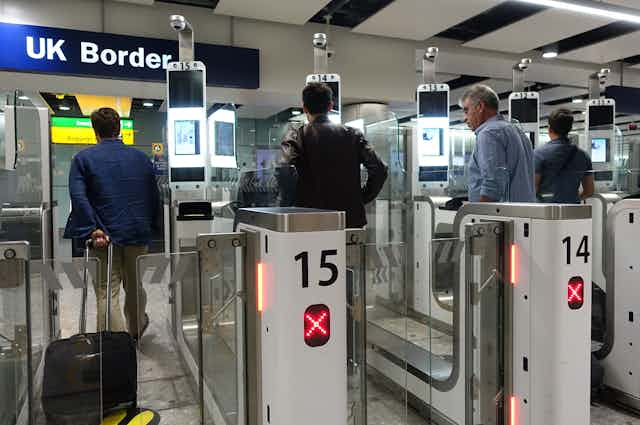The UK government has spent the past three years working to reduce the number of refugees coming to the country. At the same time, political crises around the world have meant millions of people needing to flee their home countries and seek asylum elsewhere, including the UK.
Alongside new laws designed to tighten the asylum system, the government has launched two bespoke humanitarian visa schemes providing “safe and legal routes” for people from Hong Kong and Ukraine amid political turmoil and war. These schemes exempt beneficiaries from going through the usual asylum process, and give them immediate access to live and work in the UK – something that is denied to other asylum seekers.
The government has presented these schemes as evidence of the Conservatives’ enduring commitment to defending human rights and providing humanitarian protections. To date, more than 324,000 Hong Kongers and Ukrainians have come to the UK through these routes.
Our new report drawn from in-depth interviews with 43 people, reveals what the people who have used these routes actually think of them. What they’ve told us shows that these programmes, while providing some protections, are not a viable replacement for the UK’s mainstream refugee protection.
Hong Kongers: paying for protection
The first of these schemes was a humanitarian visa introduced in January 2021 for those eligible for British National Overseas (BN(O)) status seeking to leave Hong Kong in the wake of political oppression, including the introduction of the national security law which gives the pro-Beijing administration extensive powers of arrest and detention.
To be eligible for this scheme, applicants must demonstrate that they can support themselves in the UK for six months and pay the associated visa fees and healthcare surcharge. For a two-and-a-half year visa, costs amount to £1,740. For a five-year visa it is £3,370.
This visa is unusual among humanitarian protections, in that people have to pay for the protections they are offered. They have the right to live, work and study in the UK, but limited or no access to welfare support. This contrasts to the support offered to others with refugee status, and those coming to the UK through its other designated humanitarian routes.
For the Hong Kongers we spoke to, many reported being unable to find work that matched their skills and experiences. One interviewee highlighted that she was working shifts in a factory, where previously her degree-level training meant that she had been a office worker. Others faced difficulties finding suitable housing upon arrival, particularly for those seeking rental accommodation.
Most people with refugee status who want to study at university in the UK pay “home student” fees to do so. But Hong Kongers on the BN(O) scheme are considered international students, and must pay a higher fee status to study at university.
The scheme allows a route to permanent residence after five years. While Hong Kongers felt the visa offered them protection temporarily, they said they did not feel sufficiently supported to settle long-term in the UK. Candice, a young Hong Konger, explained some of the challenges:
I know that Hong Kong people have no recourse to public funds. But actually some of their situations, they really need some help from social services (…) , they [social services] also have the responsibility to help […] the Hong Kong people are not like really want to rely on the benefit, but sometimes they just need like a little help.
Ukrainians: protection, but for how long?
The UK introduced visa schemes in March 2022 for Ukrainians fleeing after Russia’s invasion. People must apply for a visa before travelling to the UK, and eligibility depends on either UK family connections or community sponsorship from churches, local organisations or volunteers.
As sponsors have to demonstrate that they have suitable accommodation, Ukrainians arriving in the UK do not have to worry about finding housing. They gain the immediate right to work, access to certain welfare benefits, and a home fee status for those seeking university education, among other rights.

The biggest concern for Ukrainians on the scheme who we spoke to is that the protections are temporary, lasting just three years and with no clear pathway yet to permanent residence. Refugees typically get permission to stay for a minimum of five years initially, after which they can apply to settle long-term in the UK.
Ukrainian visa holders see their right to stay as contingent on the evolving events in Ukraine. This is, of course, affected by the changing political climate and wavering commitment to Ukraine in the UK and the west.
This uncertainty impedes their ability to plan for the future, and makes those on the scheme feel insecure. It has had practical implications too, with many Ukrainians facing homelessness after being unable to secure long-term housing. Ukrainian children on this scheme are spending important formative years in the UK and many feel increasingly anchored to the UK irrespective of the outcome of the war.
Oksana, a Ukrainian visa holder in her 40s, felt this uncertainty:
I can’t imagine what the UK government will do in the future. After three years […], it’s for me like no future … I need to know what I can expect after maybe one year, two year. Because I can’t imagine it.
Contrary to the government’s claims that these arrangements are robust forms of humanitarian protection, people on the visas are facing significant challenges. There is clearly some distance between what the government considers appropriate protection for people fleeing war and political oppression, and the experiences of those benefiting from said protection.
If the plan is to offer more of these schemes, more thought must be given to how they can help vulnerable people integrate in the UK Over the long term – not leaving them insecure and struggling to support themselves.

